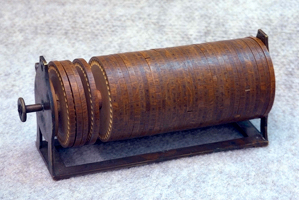Estonian Cryptography
History
Pre-history: Estonians were also active on radio-intelligence before the WW2. Some involved people were Andres Kalmus and Olev Õun. See the next links:
- Estonian Interwar Radio-Intelligence, Ivo Juurvee,
Baltic Defence Review, 2(10), 2003.
Short quote:
Olev Õun was especially talented, who was, in Hallamaa.s opinion, a phenomenal decipherer, and had managed to break the latest code of the Red Army during the Polish campaign in September 1939. Unfortunately, no materials are available to support or argue the words of that high-ranking Finnish intelligence officer. [...] Jari Leskinen, pp. 303-305. German military attaché in Tallinn, Colonel Horst Rsing, evaluated the Estonian radio-intelligence against the Soviet Union as more successful than the Finnish one
- Secrets of Signals Intelligence During the Cold War: From Cold War to Globalisation, Swedish Signal Intelligence, 1900-1945 and probably several other books mention shortly the Estonian Sigint units. In particular the second book claims that Andres Kalmus was a highly competent technical expert in radio intelligence, while Olev Õun was a talented Estonian cryptanalyst.
See Google for more.
No publicly known developments in cryptography happened in Estonia during the Soviet occupation.
Modern history:  After Estonia became independent 1991, a data
security division was created at the then Institute of Cybernetics. Ahto
Buldas is one of the people who has worked in this division since the
beginning.
After Estonia became independent 1991, a data
security division was created at the then Institute of Cybernetics. Ahto
Buldas is one of the people who has worked in this division since the
beginning.
The first contemporary crypto group gathered (or more precisely, started to gather) in 1996, when also Helger Lipmaa was hired by the Institute of Cybernetics. In August 1996, Ahto, Helger and Jan Willemson sat together and wrote their first grant application. (Note that Ahto and Helger were PhD students at this time. Jan was a MSc student. The grant application succeeded!) The picture on the right was done during this, and we half-jokingly told to each other that in 100 years, when Estonian cryptography is world-famous and they decide to publish a book called "Estonian Cryptography 100", this picture will be on its front page. We made a first contact with Peeter Laud somewhen in 1997, and he started to informally collaborate with us.
Jan and Peeter were formally hired only in January 1998, when Cybernetica AS, a spin-off of the Institute of Cybernetics, founded its Data Security Lab in Tartu. We published our first paper in Crypto 1998, one of two most important venues in cryptography. Before that, only Ahto had some experience with publishing and for other three, it was actually the first even submitted paper. So it started.
By
2008, the cryptography research group was the largest group in Estonian
computer science, with six PhD's and quite a stable research output over
years. Most of the members (though not all) were hired by Cybernetica AS
while also carrying part-time teaching duties in different Estonian
universities. The picture on the right was made in 1995 to celebrate 9
years of Estonian cryptography in Aarhus, during the Eurocrypt - it also has
Emilia Käsper.
Some of our people have been abroad for a longer time. Helger Lipmaa was a professor at Helsinki University of Technology from 2001 to 2005, and worked at University College London from 2006 to 2008. Peeter Laud got his PhD from University of Saarbrücken in 2002. Sven Laur got his PhD from Helsinki University of Technology in 2008. Emilia Käsper got her PhD in Leuven, after finishing her MSc while mostly working at Helsinki University of Technology in 2006. Ago-Erik Riet did his BSc in Estonia in 2006, then moved to Cambridge and then finished his PhD in combinatorics under Bela Bollobas.
Around 2011, Estonian University also started to employ foreign cryptographers. The current group in Tartu includes Dominique Unruh as a professor.
Currently, the most active research group is at University of Tartu. Another larger group is at Cybernetica.

Main page ●○
History ●○
People ●○
Research ●○
Publications ●○
Best cited papers ●○
Teaching ●○
Seminars ●○
Links ●○